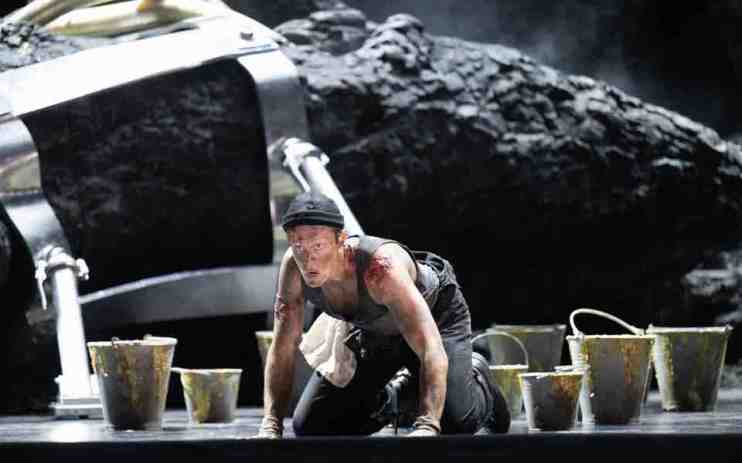Das Rheingold at the Royal Opera House is enthralling

As the first opera in Richard Wagner’s Ring Cycle, new productions of Das Rheingold attract intense scrutiny. Establishing the visual language for one production is hard enough, but setting the tone for three more operas is no mean feat.
Director Barrie Kosky knows this, because this production marks his second stab at directing the epic story, and he hasn’t taken the responsibility lightly. To the relief of many, Kosky and conductor Antonio Papanno have cooked up a complete storm.
Kosky’s vision is simple. The curtain rises on the great remains of a felled tree, slowly smouldering as the earth goddess Erda, played by Rose Knox-Peebles, inches onto stage. Stark naked and as old as time itself, Erda’s innate vulnerability places her fate beyond her control and in the hands of the earth’s power-hungry inhabitants. From here, it’s easy to see where Kosky’s ideas are heading; this Das Rheingold heralds a dire climate apocalypse.
Having failed to catch the attention of the beautiful Rhinemaidens, the Nibelung Alberich, sung by the compelling Christopher Purves, sets his sights on the ultimate power of the Rheingold. His eventual theft of the Rheingold, the oozing golden sap of the felled tree which is linked to Erda herself, is not only a reflection of his lust for power, but also his betrayal of nature. By shipping countless buckets of Rhein-goop to Nibelheim Alberich kickstarts the destruction of the earth, and mother nature with it.
Turning Wagner’s tale of heartless greed, which laments the woes of industrial capitalism, into an allegory for climate insouciance is both timely and compelling. Scene three, which has Erda sporting a pair of welding goggles while being ensnared in Alberich’s laboratory, risked coming across as a bit ‘Red Dwarf’, but Pappano in the pit always brings the focus back to the intense character drama. With a handful of gods to reckon with, Alberich’s plan to forge and wield the ring of power does not go unchallenged, but the seeds of greed have been sown, and the damage is irreparable.
The gods, all clad like leisurely aristos, worked well together. As the ruler of the gods, and owner of a planet sized ego, Wotan’s power was made real with Christopher Maltman’s commanding and unrelenting baritone. Sean Panikkar’s Loge was largely compelling, terrific in his more sadistic moments, though not every giggle and prance entirely convinced. Marina Prudenskaya’s Fricka, clearly channelling princess Anne in style, was delightfully waspish.
The Rhinemaidens, too, displayed considerable skill in their performances, aided in no small part by the Royal Opera House orchestra. From the first deep rumbling of the strings in the prelude to the final cries of the Rhinemaidens as the gods cross the rainbow bridge and sequester themselves in Valhalla, it’s a musically enthralling production.
Although we’ll have to wait over a year for Die Walküre and until 2028 for the proposed full cycle, Kosky’s Rheingold has set a high bar. All eyes on the Valkyrie then, for the next instalment of this apocalyptic joy ride.